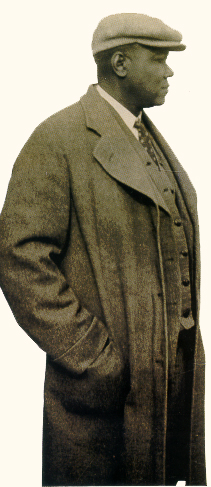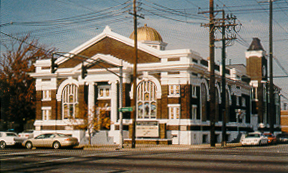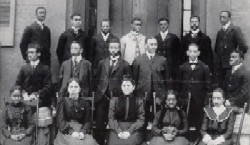Samuel M. Plato: Building a Dream
By Pen Bogert
Reference Specialist
About |
 Samuel
M. Plato (1882-1957) was a prominent African-American
architect and builder who not only made important
contributions to the African-American community in
Louisville but also achieved national recognition for his
imaginative designs elsewhere in the country. He
completed his education and began his career at a time when
segregation and racism were major obstacles for
African-Americans who sought to pursue professional careers
such as architecture.
Samuel
M. Plato (1882-1957) was a prominent African-American
architect and builder who not only made important
contributions to the African-American community in
Louisville but also achieved national recognition for his
imaginative designs elsewhere in the country. He
completed his education and began his career at a time when
segregation and racism were major obstacles for
African-Americans who sought to pursue professional careers
such as architecture.
When Plato graduated from State University Normal School in Louisville in 1902 and completed his mail-order program in architecture with International Correspondence Schools, he became part of a small pioneering African-American architects who made their mark early in the last century.
Like other pioneers, Plato struggle against racism, helping pave the way for those who followed in his footsteps. During his early years in Marion, Indiana, he was successful in his fight to open up the building trade unions to African-American workers. He was the first African-American to be awarded a contract to build a post office, and he was one of only a few African-American contractors to build federal government defense housing projects during World war II. Plato was successful because of his persistent efforts and because his reputation for quality and integrity could not be ignored.
Among the basic tenets of Plato's life were his belief in helping others to help themselves and his devotion to his family, which was always at the center of his life. In 1939 he devised a plan to move his sister and her family off the old homestead in Waugh, Alabama, and into a new home nearby. Samuel an Elnora Plato (1891-1975) helped put several nieces and nephews though college and graduate school, and Plato employed some of them on jobs in Louisville and Washington, D.C. Elnora Plato, his second wife, was his constant traveling companion, and business manager. She had built her own successful dressmaking business before their marriage, and she used her own funds from this enterprise to help make Plato's dreams possible. She funded the cost of his sister's new house in Waugh and, on more than one occasion, she was able to keep heir company from going bankrupt.
 Plato designed and built a wide variety of buildings, including Greek Revival and Craftsman-style houses, elegant mansions, post offices, banks, churches, schools, office buildings, theaters, and government housing projects. Eight of his buildings are listed on the national Register of Historic places, including the Broadway Temple A.M.E. Zion Church in Louisville.
Plato designed and built a wide variety of buildings, including Greek Revival and Craftsman-style houses, elegant mansions, post offices, banks, churches, schools, office buildings, theaters, and government housing projects. Eight of his buildings are listed on the national Register of Historic places, including the Broadway Temple A.M.E. Zion Church in Louisville.
During his career he was in demand as a speaker at The Tuskegee Institute and The Hampton Institute. He was honored posthumously in 1960 by the Howard University School of Engineering and Architecture, where he had been a special lecturer. He was admired and respected by everyone. Perhaps Elnora Plato summed it up best when she wrote that he "was a pioneer for years and he wanted his business to live. Then, too, he wanted to inspire young engineers."

The Filson Historical Society
1310 South Third Street - Louisville, KY 40208
Phone: (502) 635-5083 Fax: (502) 635-5086
Hours
The Ferguson Mansion and Office
Monday - Friday: 9 am. - 5 pm.
Saturday and Sunday closed
Library
Monday - Friday: 9 am. - 5 pm.
Saturday: 9 am. - 12 noon
